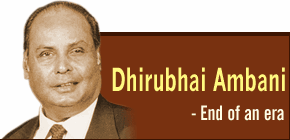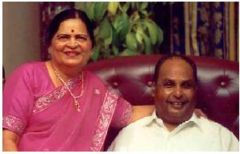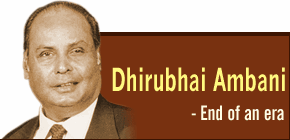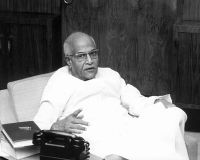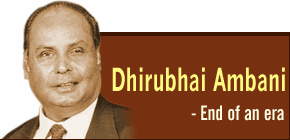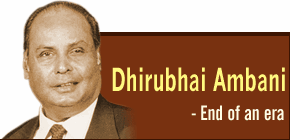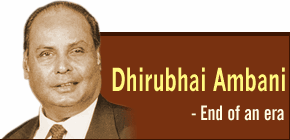Dhiru bhai ambani built india largest private sector company
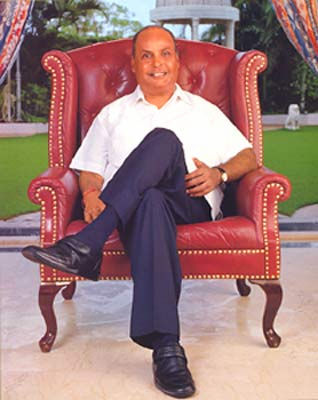

Achievements: Dhirubhai Ambani built India's largest private sector company. Created an equity cult in the Indian capital market. Reliance is the first Indian company to feature in Forbes 500 list
Dhirubhai Ambani was the most enterprising Indian entrepreneur. His life journey is reminiscent of the rags to riches story. He is remembered as the one who rewrote Indian corporate history and built a truly global corporate group.
In 1992, Reliance became the first Indian company to raise money in global markets, its high credit-taking in international markets limited only by India's sovereign rating. Reliance also became the first Indian company to feature in Forbes 500 list.
Dhirubhai Ambani was named the Indian Entrepreneur of the 20th Century by the Federation of Indian Chambers of Commerce and Industry (FICCI). A poll conducted by The Times of India in 2000 voted him "greatest creator of wealth in the century".
Each changed India. Ambani's public wore his textiles as durable suits and glittery saris. Indians invested by the millions in his Bombay-listed Reliance Industries, a sprawling conglomerate with $12.3 billion in annual sales that recently became India's first privately owned entrant to the Fortune 500. When Ambani died on July 6 at age 69 after nearly two weeks in a stroke-induced coma, the country's media recounted his rags-to-riches life as an Indian morality play.
Dhirubhai Ambani, Indian businessman, was born in Chorwad, Gujarat, on December 28, 1932. He died in Bombay on July 6, 2002, aged 69. Dhirubhai Ambani is survived by his wife, two sons and two daughters. His two American-educated sons have been in day-to-day control of the company since he suffered a stroke in 1986. He suffered a further stroke 12 days ago from which he never recovered.
Sensing an opportunity in the textile industry — higher disposable incomes were leading to Indians buying better, more expensive clothes — Ambani sought and received the necessary clearances to manufacture cloth from polyester fibre. He opened his first textile mill in Naroda, near Ahmedabad, in 1966 and then concentrated on quietly building up his business. Vimal, the textile brand he established, flourished and remains a household name in India today.
4
By the late 1980s the Reliance group was one of India’s most influential and profitable concerns. However, the phenomenal growth of Reliance owed as much to Ambani’s acumen as to the ease with which he was able to get official rules and regulations — including import tariffs — introduced, amended or scrapped in order to undercut his rivals and push his own business interests. His methods earned him many bitter enemies in India’s corporate world. Ambani nevertheless forged ahead, cultivating friends in virtually every Indian political party and managing the media in such a way that critical stories about Reliance’s unconventional business methods seldom made it into the newspapers.
The final phase of Reliance’s diversification occurred in the 1990s when the company turned aggressively towards petrochemicals and telecommunications. But, like most business people, Ambani had rivals, the most bitter of whom was Nusli Wadia, of Bombay Dyeing, a patrician entrepreneur whose company was well established in the textile industry.
readily concede that Ambani had a vision and matchless business acumen
5
6
Dhirubhai Ambani Biography
Kokilaben and Dhirubhai Ambani
The business was setup in partnership with Champaklal Damani, his second cousin, who used to be with him in Aden, Yemen. The first office of the Reliance Commercial Corporation was set up at the Narsinathan Street in Masjid Bunder. It was a 350 Sq. Ft. room with a telephone, one table and three chairs. Initially, they had two assistants to help them with their business. In 1965,
7
Sensing a good opportunity in the textile business, Dhirubhai started his first textile mill at Naroda, near Ahmedabad in the year 1966. Textiles were manufactured using polyester fibre yarn. Dhirubhai started the brand "Vimal", which was named after his elder brother Ramaniklal Ambani's son, Vimal Ambani. Extensive marketing of the brand "Vimal" in the interiors of India made it a household name. Franchise retail outlets were started and they used to sell "only Vimal" brand of textiles. In the year 1975, a Technical team from the World Bank visited the Reliance Textiles' Manufacturing unit. This unit has the rare distinction of being certified as "excellent even by developed country standards" during that period.
Initial Public Offering
Dhirubhai managed to convince a large number of first-time retail investors to participate in the unfolding Reliance story and put their hard-earned money in the Reliance Textile IPO, promising them, in exchange for their trust, substantial returns on their investments.
8
On Dhirubhai Ambani's first birthday after his death, The Government of India released a postage stamp in his memory. Denomination Rs 5. The fuction was presided over by the then Minister for Communications and Information Technology, Pramod Mahajan and members of Ambani's Family including Kokilaben Ambani (Dhirubhai's Wife), Mukesh Ambani and Anil Ambani (Dhirubhai's sons)
The Bear Cartel was acting on the belief that the Bulls would be short of cash to complete the transactions and would be ready for settlement under the "Badla" trading system prevalent in Bombay Stock Exchange during those days. The bulls kept on buying and a price of Rs. 152 per share was maintained till the day of settlement. On the day of settlement, the Bear Cartel was taken aback when the Bulls demanded a physical delivery of shares. To complete the transaction, the much needed cash was provided to the stock brokers who had brought shares of Reliance, by none other than Dhirubhai Ambani. In the case of non-settlement, the Bulls demanded an "Unbadla" (a penalty sum) of Rs. 35 per share. With this, the demand increased and the shares of Reliance shot above 180 rupees in minutes. The settlement caused an enormous uproar in the market and Dhirubhai Ambani was the unquestioned king of the stock markets. He proved to his detractors just how dangerous it was to play with Reliance.
Diversification
Over time, Dhirubhai diversified his business with the core specialisation being in petrochemicals and additional interests in telecommunications, information technology, energy, power, retail, textiles, infrastructure services, capital markets, and logistics. The company as a whole was described by the BBC[18] as "a business empire with an estimated annual turnover of $12bn, and an 85,000-strong workforce".
10
Dhirubhai Ambani Biography
At one point in time, Ramnath Goenka was a friend of Dhirubhai Ambani. Ramnath Goenka was also considered to be close to Nusli Wadia. On many occasions, Ramnath Goenka tried to intervene between the two warring factions and bring an end to the enmity. To this day, there is no satisfactory explanation as to why Goenka and Ambani became rivals. Later on, Ramnath Goenka chose to support Nusli Wadia. At one point of time, Ramnath Goenka is believed to have said "Nusli is an Englishman. He cannot handle Ambani. I am a bania. I know how to finish him".
Dhirubhai Ambani Biography
have said "Everybody rapes the system but this man wants to make it his mistress". Critics also admired Goenka for his ability to run these articles without any help from his regular staff. Dhirubhai Ambani was also getting more recognition and admiration, in the meantime. A section of the public started to appreciate Dhirubhai's business sense and his ability to tame the system according to his wishes.
12
Dhirubhai Ambani Biography
His funeral procession was not only attended by business people, politicians and celebrities but also by thousands of ordinary people. His elder son, Mukesh Ambani, performed the last rites as per Hindu traditions. He was cremated at the Chandanwadi Crematorium in Mumbai at around 4:30 PM (Indian Standard Time) on July 7, 2002.
He is survived by Kokilaben Ambani, his wife, two sons, Mukesh Ambani and Anil Ambani, and two daughters, Nina Kothari and Deepti Salgaocar.
Dhirubhai Ambani Biography
The nation had lost one of the doyens of the modern Indian corporate community, a philanthropist and above all a great human being endowed with great compassion and concern for the underprivileged sections of the society.
In November 2004, Mukesh Ambani in an interview, admitted to having differences with his brother Anil over 'ownership issues.' He also said that the differences "are in the private domain." He was of the opinion that this will not have any bearing on the functioning of the company saying Reliance is one of the strongest professionally-managed companies. Considering the importance of Reliance Industries to the Indian Economy, this issue got an extensive coverage in the media.
Kundapur Vaman Kamath, the Managing Director of ICICI Bank was seen in media, a close friend of the Ambani family who helped to settle the issue. The brothers had entrusted their mother, Kokilaben Ambani, to resolve the issue. On June 18, 2005, Kokilaben Ambani announced the settlement through a press release.
– Kokilaben Ambani
The Reliance empire was split between the Ambani brothers, Mukesh Ambani getting RIL and IPCL & his younger sibling Anil Ambani heading Reliance Capital, Reliance Energy and Reliance Infocomm. The entity headed by Mukesh Ambani is referred to as the Reliance Industries Limited whereas Anil's Group has been renamed Anil Dhirubhai Ambani Group (ADAG)
Awards and Recognitions
• November 2000 – Conferred 'Man of the Century' award by Chemtech Foundation and Chemical Engineering World in recognition of his outstanding contribution to the growth
A poll conducted by The Times of India in 2000 voted Him "Greatest Creator of Wealth |
|---|
In The Centuries".'
efforts greater. This is my dream for Reliance and for India."
|
|---|
• "Between my past, the present and the future, there is one common factor: Relationship
and Trust. This is the foundation of our growth"


